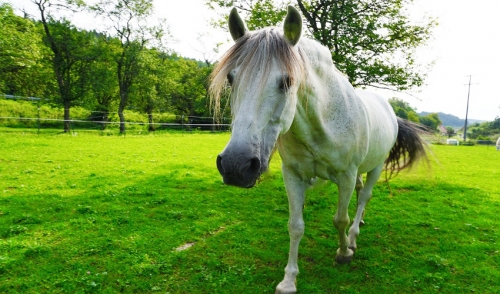
How Do I Help My Older Horse From Losing Weight?
Horses are beautiful creatures that require different levels of maintenance and care over time. Even though horses today will often live longer than their grandparents and sustain better health, there’s still a number of tips and tricks to follow to make sure your horse continues to have a productive career and wholesome retirement. When it comes to horses, father time and mother nature take its toll on the body in predictable ways. One of the biggest ways older horses are affected by old age is sudden weight loss. Keep reading this article to discover some helpful tips and advice on how to manage your horse's health and keep it from losing weight.
Old age will manifest in horses differently depending on the breed. Just because a horse is turning gray doesn’t mean it requires a lot of changes. One horse may be well into its 20s showing no sign of decline while others show different complications in their teens. In most cases, the point in which a horse becomes older or even geriatric is when it can no longer effectively holds its weight. It’s a common fact that horses over the age of 20 often lose the ability to process and absorb enough energy to maintain a healthy weight. Your 20-year-old stallion can quickly turn into a thin, ribby, and less robust version of itself. To help solve this problem, start by analyzing your horse’s current feeding program. Take note of how much feed your horse taking in and assess whether it’s the adequate amount of food and if it has all the appropriate ingredients a horse of his age would need to thrive. A horse’s dietary need is often dictated by its breed, sex, age, activity level, and other statuses. Be mindful of these factors as you make any supplemental changes to your horses’ diet. It sounds picky but handling your horse’s diet is critical to its longevity as it grows older. Examine the unique components and ingredients to make the pasture, hay, and any other supplements all serve the right purpose. One common cause of weight loss in horses is a sudden decline in hay quality. Although you may be using the same trusted supplier, occasionally the hay is harvested before it reaches full maturity meaning the nutrient profile of the hay is far less than expected. Your supplier may not consider environmental conditions and how it affects the overall nutrient content of their product resulting in lower quality hay that won’t have any positive effects on your horse.
Moreover, keep track of how much food is actually being consumed as this could be another reason why your horse is having trouble with its weight. Check your horse’s overall health to make sure there’s nothing internally with its teeth or digestion that will prevent it from consuming its daily intake. Addressing weight loss can be as simple as adding water to the feed is easier to digest or adding a supplement or two to improve gastro efficiency.
There’s no crazy formula to caring for older horses. Like with people, the best thing you can do for your animal is staying vigilant and be proactive to whatever issues that may arise to prevent any hurdle from becoming a full-blown problem. Consult your veterinarian if your horse continues to show decline or to address any underlying medical issues. With proper care, your horse will live a full life well into retirement
